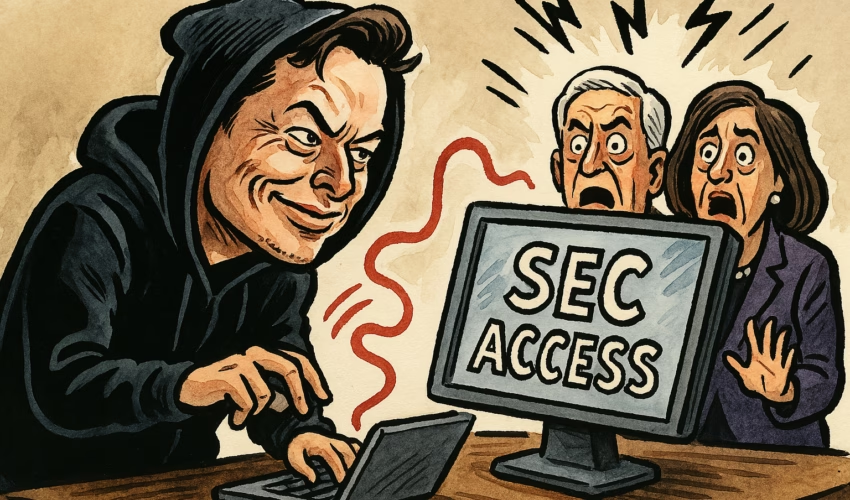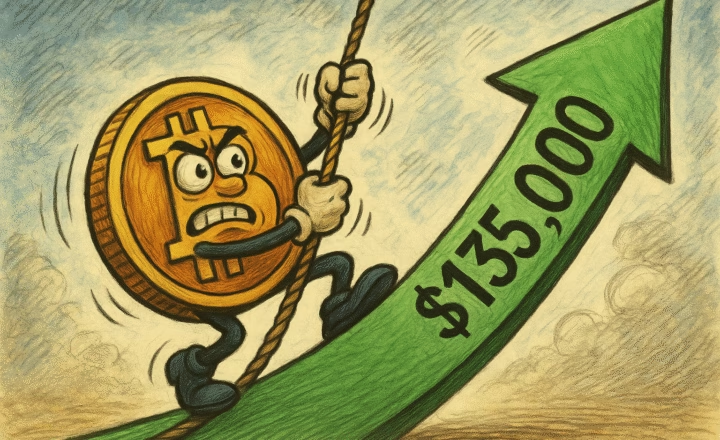As Trump-era reform collides with market oversight, concerns mount over investor protections and institutional independence
A Collision Course Between Innovation and Oversight?
U.S. Representative Maxine Waters, the top Democrat on the House Financial Services Committee, has sounded a sharp warning over reports that Elon Musk’s “Department of Government Efficiency” (DOGE) could soon gain access to sensitive data and systems at the U.S. Securities and Exchange Commission (SEC).
In a March 31 statement, Waters reiterated her February letter to acting SEC Chair Mark Uyeda, cautioning that DOGE’s influence within the SEC could have “dire consequences” for U.S. investors, potentially undermining the agency’s independence and creating massive conflicts of interest.
“Musk… can benefit his own businesses and harm his competitors by using his access to confidential business information and his influence over the agency’s operations,” Waters wrote.
DOGE, which operates as an advisory group to President Donald Trump, is not a formal agency established by Congress. Yet its growing involvement in federal departments—especially its rumored penetration into the SEC—is sparking alarm among regulators, lawmakers, and market participants alike.
Background: DOGE, Musk, and the Trump Administration
Since being designated a “special government employee” in early 2025, Musk has led aggressive cost-cutting efforts under the DOGE banner, targeting agencies such as:
-
USAID (U.S. Agency for International Development)
-
CFPB (Consumer Financial Protection Bureau)
-
EPA (Environmental Protection Agency)
In many cases, these efforts have included staff terminations, program overhauls, and internal audits—moves that have triggered a wave of federal lawsuits alleging unconstitutional conduct and overreach.
Reports now suggest DOGE has contacted the SEC’s internal teams and is seeking access to agency systems and regulatory data. The lack of official transparency about the scope of this access has raised red flags in Washington.
The Crypto Factor: Political Reversal at the SEC?
The controversy comes at a pivotal moment for the crypto industry’s relationship with U.S. regulators.
Since Trump returned to office, the SEC has:
-
Dropped multiple high-profile lawsuits against crypto firms
-
Deprioritized enforcement actions tied to token classifications
-
Shifted its tone toward “market-friendly oversight”
This marks a stark contrast to the aggressive posture taken under former SEC Chair Gary Gensler, who pursued dozens of enforcement actions against crypto platforms, including Coinbase, Binance, and Uniswap.
Critics now worry that DOGE’s influence—coupled with Musk’s known ties to crypto ventures (and his support for Dogecoin)—could undermine fair regulatory standards and selectively benefit certain actors in the industry.
Waters’ Core Concerns: Market Integrity at Risk
Waters’ letter lists several key concerns:
-
Data security breaches: DOGE involvement could compromise sensitive market data held by the SEC
-
Investor risk: Unauthorized access or misuse of information could lead to market manipulation or the targeting of specific companies
-
Conflict of interest: Musk’s prior legal clashes with the SEC, as well as his active business holdings in AI, crypto, and fintech, make him an inherently conflicted overseer
“The agency is at greater risk of data breaches and market disruptions, both of which could result in investors, including retirees, losing their hard-earned savings,” Waters warned.
Political Implications: SEC Leadership at a Crossroads
DOGE’s rumored infiltration of the SEC comes as the Senate Banking Committee prepares to vote on Trump’s nominee to lead the agency, Paul Atkins.
Atkins, a former SEC commissioner and long-time deregulatory advocate, expressed willingness to work with DOGE during his March 27 confirmation hearing. That comment prompted immediate scrutiny from Democrats, who raised concerns about potential favoritism toward the crypto sector and a weakening of institutional checks and balances.
If confirmed, Atkins could oversee the most dramatic restructuring of the SEC in decades, with potential consequences for public companies, exchanges, and the integrity of U.S. capital markets.
Independent Analysis: Reform or Regulatory Capture?
DOGE’s stated goal is to reduce bureaucratic inefficiencies and modernize government—but the implications for market supervision are far from neutral.
-
Elon Musk is not a disinterested advisor. His companies, influence, and litigation history make him a complex actor in any regulatory environment.
-
If DOGE gains system-level access, it could influence enforcement timelines, pending investigations, and internal agency communication—especially in high-stakes sectors like crypto, AI, and energy.
-
Market confidence may erode if the perception of regulatory capture grows stronger, particularly among foreign investors and institutional asset managers.
What’s at stake is not just the structure of the SEC, but the broader trust in the fairness and neutrality of U.S. financial oversight.
Final Thoughts: Watch This Space Closely
If DOGE does gain backdoor access to SEC systems, it may not only alter enforcement dynamics but also shake investor confidence in how securities law is administered—especially in emerging sectors like crypto.
With confirmation votes and court challenges looming, the next several weeks could define the future of regulatory independence in the Trump era—and determine whether DOGE becomes a tool for modernization or a symbol of overreach.












